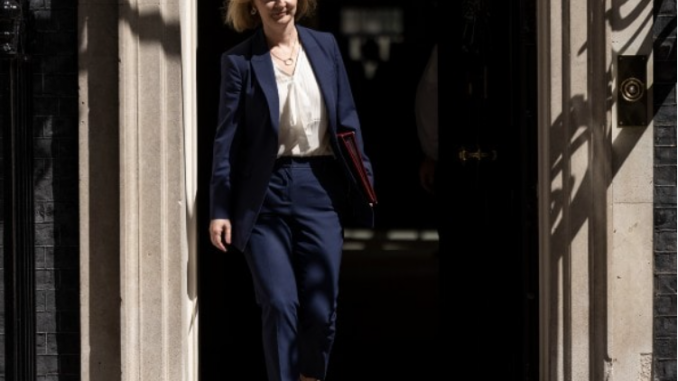
UK foreign minister Liz Truss on Sunday joined the race to succeed Boris Johnson as prime minister and leader of the ruling Conservative party, as the fractious contest focused on tax.
Truss, 46, announced her candidacy in the Daily Telegraph newspaper on Sunday evening, saying she had “a clear vision of where we need to be, and the experience and resolve to get us there”.
The bid by Truss, seen as a frontrunner in the Tory leadership contest, followed that of former defence minister Penny Mordaunt as the race expanded to 11 candidates.
Mordaunt, 49, an ex-navy reservist who has also held several senior ministerial roles, is not among the favourites to succeed Johnson in recent polls of Tory party members ultimately set to choose their new leader.
But such contests are notoriously unpredictable, and with more than a dozen lawmakers from multiple factions of the ruling party potentially set to run, political commentators say few contenders can be discounted.
The early favourite is former finance minister Rishi Sunak, who launched his campaign Friday after helping to kickstart the cabinet revolt that led to Johnson’s forced resignation Thursday. He is now drawing early fire from Johnson loyalists and rival candidates.
Sunak and former health minister Sajid Javid — who has also declared his candidacy — both resigned late Tuesday, prompting dozens of more junior colleagues to follow suit.
That forced Johnson to then quit as Tory leader 36 hours later.
But the 58-year-old leader, whose three-year premiership has been defined by scandal, the country’s departure from the European Union and the Covid pandemic, said he would stay on until his successor is selected.
– Crowded field –
Former foreign secretary Jeremy Hunt, who finished runner-up to Johnson in the last contest in 2019, announced late Saturday he will stand again.
Current finance minister Nadhim Zahawi — only appointed to the post Tuesday — and Transport Secretary Grant Shapps have also launched bids.
They join attorney general and arch-Brexiteer Suella Braverman, the relatively unknown former equalities minister Kemi Badenoch and backbench Tory MP Tom Tugendhat on the growing candidate list.
Another Tory lawmaker, Rehman Chishti, announced his leadership bid on Sunday evening to take the number of contenders to 11.
But Defence Secretary Ben Wallace, who has impressed in the role and been one of Tory members’ favourites, said Saturday he would not stand after a discussion with colleagues and family.
Taxation is already a key dividing line in the race, as Britain faces the toxic combination of high inflation and rampant cost-of-living increases alongside stagnant growth and relatively high tax rates.
– Focus on tax –
Announcing their bids separately in the Sunday Telegraph, Javid and Hunt both vowed to cut corporation tax from 25 to 15 percent.
Javid said he would also slash or change other taxes, including reversing a recent rise in national insurance that is ringfenced to raise health service funding.
Hunt, Shapps and Tugendhat set out their stances for lower taxes in Sunday morning television appearances, while Truss also put cutting taxes at the heart of her pitch.
But declaring his candidacy in a slick video on social media before the weekend, Sunak struck a different tone, warning Tories not to believe “fairy tale” pledges.
Meanwhile, Zahawi’s campaign appeared in early danger following Sunday newspaper reports that his personal tax affairs are under investigation by revenue and customs officials — who are part of his treasury department. He has denied wrongdoing.
– Dirty dossiers? –
The likely months-long acrimonious campaign is set to be formalised Monday when a committee of backbenchers will meet to agree the timetable and rules.
A Tuesday evening deadline to register candidacies could be imposed, according to reports.
Geoffrey Clifton-Brown, the committee’s treasurer, told LBC radio he was “absolutely confident” the contest could be whittled down to two candidates to put to members within weeks, before parliament’s summer recess starting after July 21.
First, multiple rounds of voting by all 358 Tory MPs is likely, with elimination thresholds set for each stage.
The new leader then chosen by members could be in place ahead of the Conservatives’ annual conference in early October.
Conservative commentator Iain Dale said Sunday if a consensus candidate emerged, the contest could end without party members voting, as happened in 2016 with the selection of Theresa May.
In a sign of the potential peril of a protracted fight, the Sunday Times reported some of the leadership teams had compiled so-called dirty dossiers of compromising allegations against rival candidates and their aides.
Via Newsmax
